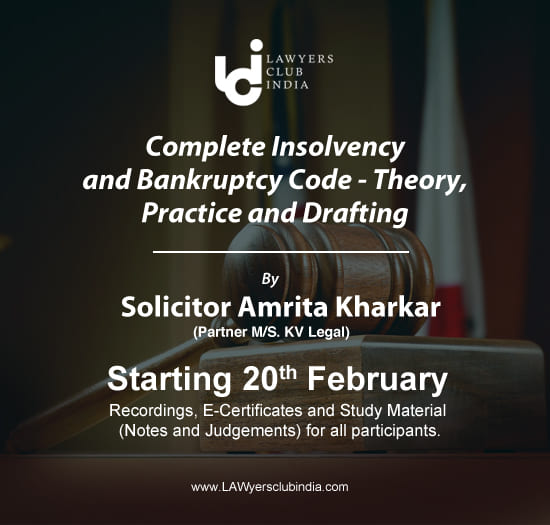OVERVIEW
The Supreme Court has intended to evaluate the judicial status with particular reference to the duration of time deemed necessary for the filing of allegations for the purposes of defaulted bail pursuant to Section 167(2) of the Code of Criminal Procedure, where the offense does not necessitate a minimum sentence and a maximum term of imprisonment for a minimum sentence and a maximum term of imprisonment of more than ten years.
A three-judge judicial bench headed by Justice Ashok Bhushan, alongside Justice MR Shah and Justice Subhash Reddy issued the notice in lieu with this aspect of law in the case State (NCT of Delhi) v. Rajeev Sharma.
Major reliance was put on the case of Rakesh Kumar Paul v. State of Assam.
Click here to enroll masterclass on - The IBC - Theory, and Practice by Adv. Amrita Kharkar
FURTHER DETAILS
The convicted was registered under Section 3 of the Official Secrets Act 1923 for reportedly revealing classified relevant data to Chinese personnel. The crime charged against him resulted in a mandatory sentence of 14 years in prison; however, it did not allow for a minimum penalty.
This was a special leave petition appealing the direction of the High Court of Delhi to issue default bail to the convicted on the rationale that allegations were not lodged within a period 60 days.
The High Court of Delhi held that this was not the case alluded to in Article 167(2)(a)(i) of the CrPC, where a limit of 90 days for filing charges had been given. Pursuant to Section 167(2)(a)(i), there is a limit of 90 days for pursuing charges where the crime is punishable by death, imprisonment for life or imprisonment for a term not less than 10 years.
Challenging the order of the High Court, the Delhi Police filed a separate leave appeal to the Supreme Court.
Turning up for the plaintiff, Assistant Solicitor General Aman Lekhi argued that the "Rakesh Kumar Paul" decision needed reinstatement. The ASG argued that the contrary opinion of Justice Pant was more constitutionally feasible.
The bench, consisting of the three justices, decided to discuss the legal issue as to whether the present case is protected by the phrase "not less than 10 years" referred to in Section 167(2)(a)(i).
RAKESH KUMAR PAUL v. STATE OF ASSAM & OFFICIAL SECRETS ACT
The High Court depended heavily on the perception provided by the Apex Court in Rakesh Kumar Paul v State of Assam that Section 167(2)(a)(i) extends to cases with a minimum sentence of 10 years. In Rakesh Kumar Paul, the Supreme Court, by a vote of 2:1, ruled that the convicted will be obligated to default bail on the failure of the investigation body to file the charge sheet within 60 days of the crime being punishable for up to 10 years of imprisonment.
under the Official Secret Acts for which the applicant is being attempted, in spite of the fact that involve discipline which may amplify to 14 years’ time but the Section does not pass the test of clear period of 10 years or more, per Rajeev Choudhary (supra) and Rakesh Paul (supra) and as such the period of challan in this case would be 60 days and hence the condemned order passed by the learned MM being illicit is set aside and the appeal is permitted. The applicant is hence entitled to default safeguard; the challan having not been recorded inside 60 days.
HOW, ACCORDING TO YOU, THE ISSUE BE ADRESSED?! SHARE YOUR OPINION IN THE COMMENTS BELOW!
Click here to download the original copy of the judgment
Join LAWyersClubIndia's network for daily News Updates, Judgment Summaries, Articles, Forum Threads, Online Law Courses, and MUCH MORE!!"
Tags :others










